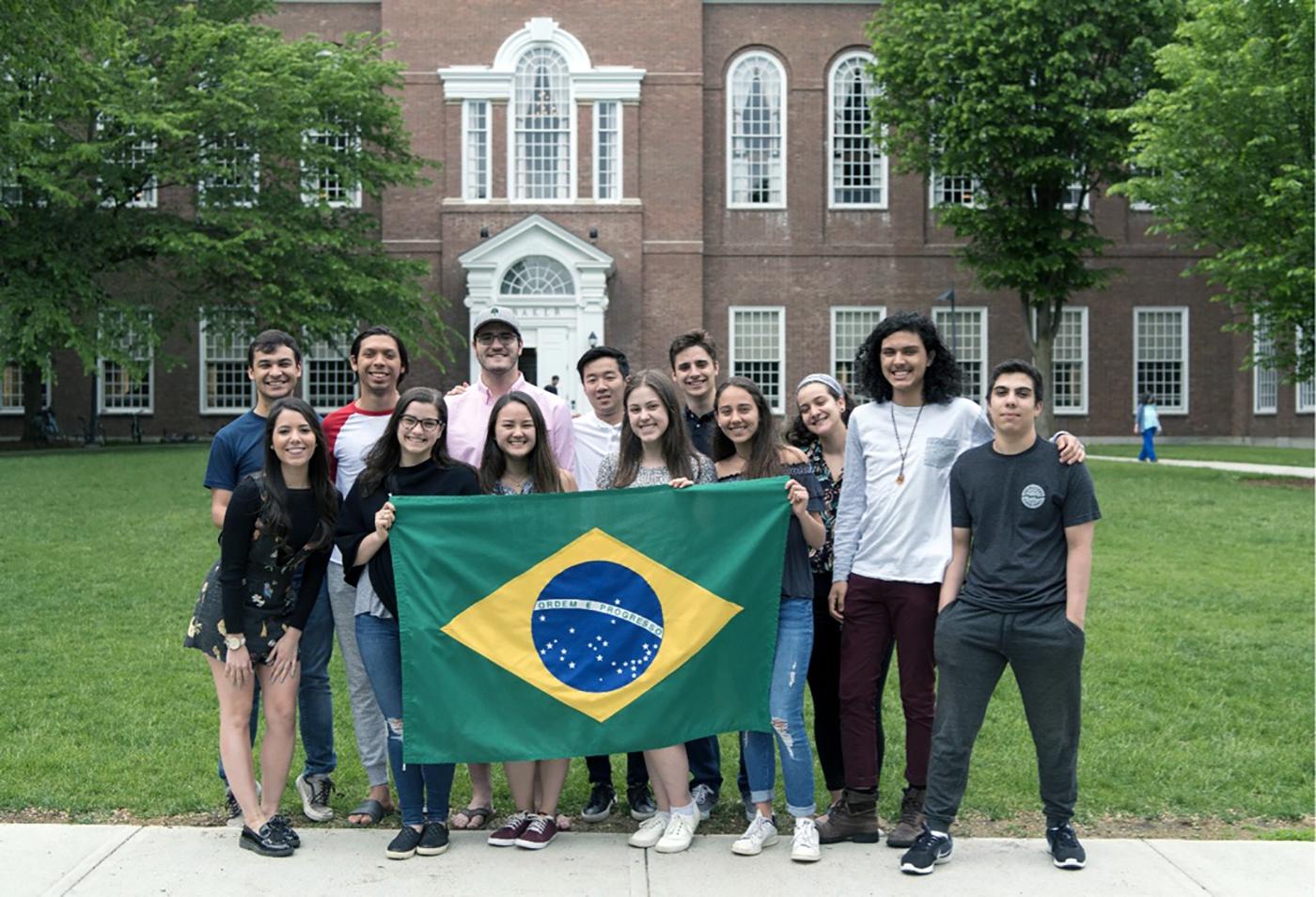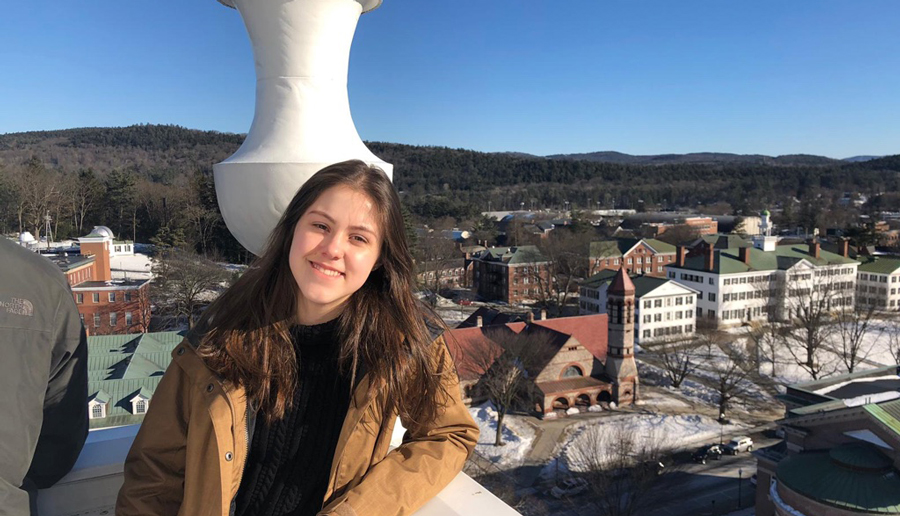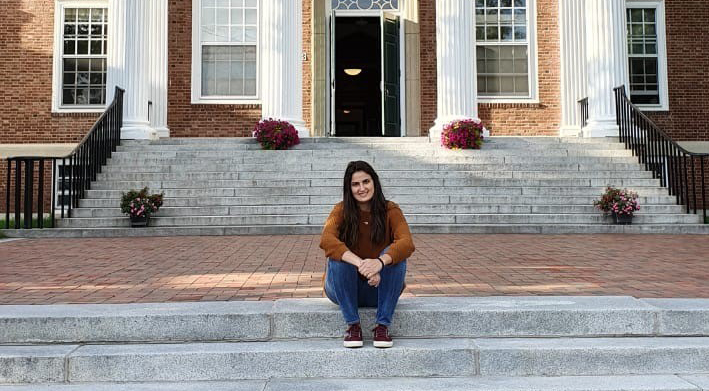A Powerful Opportunity for International Students
Rodríguez-Pastor Scholarship brings Latin American students to Dartmouth

The Rodríguez-Pastor Scholarship Program has supported 60 Latin American Tuck and undergraduate students. In 2019-2020, students came to Dartmouth through the program from seven different Latin American countries and were committed to making a difference in the world. This scholarship is an example of Dartmouth’s commitment to sustain scholarships for international need-blind admissions. Dartmouth has raised $36 million toward a goal of $90 million for this initiative.
Three Rodríguez-Pastor scholars: Julia Bonzanini ’21, Antonio Vitor B. Souza (“Vitor”) ’21, and Julia Queiroz TU’20 share their Dartmouth experiences.
Julia Bonzanini ’21
Major: Biomedical engineering with a minor in Italian
Hometown: Caxias do Sul, Brazil

In high school, I wanted to do something that combined biology, chemistry, and math. I then discovered biomedical engineering, which really interested me. Dartmouth offers a strong program where undergraduates can work directly with faculty researchers. That’s not always the case at larger universities and was a strong reason I applied to Dartmouth.
Finding a passion for engineering on a microscale
I did an exchange program in Denmark, at the Technical University in Copenhagen. That solidified for me that I wanted to pursue biomedical engineering for a career. I took a course called “Biomedical Microsystems” and fell in love with science and engineering on a microscale.
We learned about diagnostic devices you can use in a doctor’s office that produce cancer-screening results in a few minutes, and drug-delivery robotic devices that you ingest and they target an exact spot in the body where it releases the drug, making it more effective and efficient. I’m interested in these because they cut costs and can be used anywhere, such as in developing countries.
Detecting antibodies: a new engineering challenge
I now have a great opportunity to apply what I’ve learned in my capstone design course “Engineering Design Methodology.” I’m in a group of five engineering majors. We are designing and building an automated sampler to measure the concentration of antibodies in a protein.
Normally, when you do this in a lab, you have to inject samples manually into an analyzer, one at a time. Injecting two dozen samples can take 24 hours. The machine we’re designing will inject the same number of samples automatically, completing the whole process in five minutes.
Figuring out the microfluidics for this machine, the small engineering details, that’s the work I want to continue. I plan to pursue a master’s in biomedical engineering and eventually a PhD, then work in research that has a health care component.
The scholarship has made it possible for me to learn so much. In the future, I definitely want to get to a point where I can provide the same opportunity for other students.
Antonio Vitor B. Souza ’21
Hometown: Sao Paulo, Brazil
Major: Biology and economics
One of my favorite courses has been “Macroeconomics of Latin America.” Our class traveled for two weeks in Argentina and did interviews with the former president of the Central Bank of Argentina. We also met with small business owners and restaurant owners. It opened my eyes to how different the economy works there compared to the U.S.
For instance, getting loans for their businesses is much different and harder than in the U.S. Argentinians stockpile dollars more. So learning how to help develop the economy in South America and learning how to help people have better lives is complicated, but it’s something I really want to do. It’s not as simple as applying the theories I’m learning in class, which are more U.S.-centered.
After Dartmouth, I plan to work in health care consulting, then pursue graduate school. Long term, I want to work in the health care industry in Brazil and learn more about the economy there and what I can do to help.
So much would not have been possible for me without the Rodríguez-Pastor scholarship. It has allowed me to reach a different level of potential and pursue a career path I’m really interested in. I’d love to go back to Brazil one day and have my own stakes in the development issues around health care and the economy.
Julia Queiroz TU’20
Degree: MBA, Tuck School of Business
Hometown: Rio de Janeiro, Brazil

I took a course titled “CEO Experience” with John Lynch, former governor of New Hampshire. He brought in real-life cases and executives to discuss intriguing business decisions and how to think about solving them. Those are moments I will always remember.
I also was a student designer for the IDEO project that addresses social issues at Dartmouth. I helped conduct interviews and consolidate insights on how Tuck can best prepare and consider changes in shaping the future of the MBA program. As a proud Tuckie and true believer in education, it was an exciting opportunity to leave a legacy for the school.
Both my grandparents and father were entrepreneurs who had limited access to education. Having the opportunity to attend a top business school such as Tuck with a scholarship is a huge honor for me and my family. I hope someday to return the favor by helping future Latin MBA students to study at Tuck.